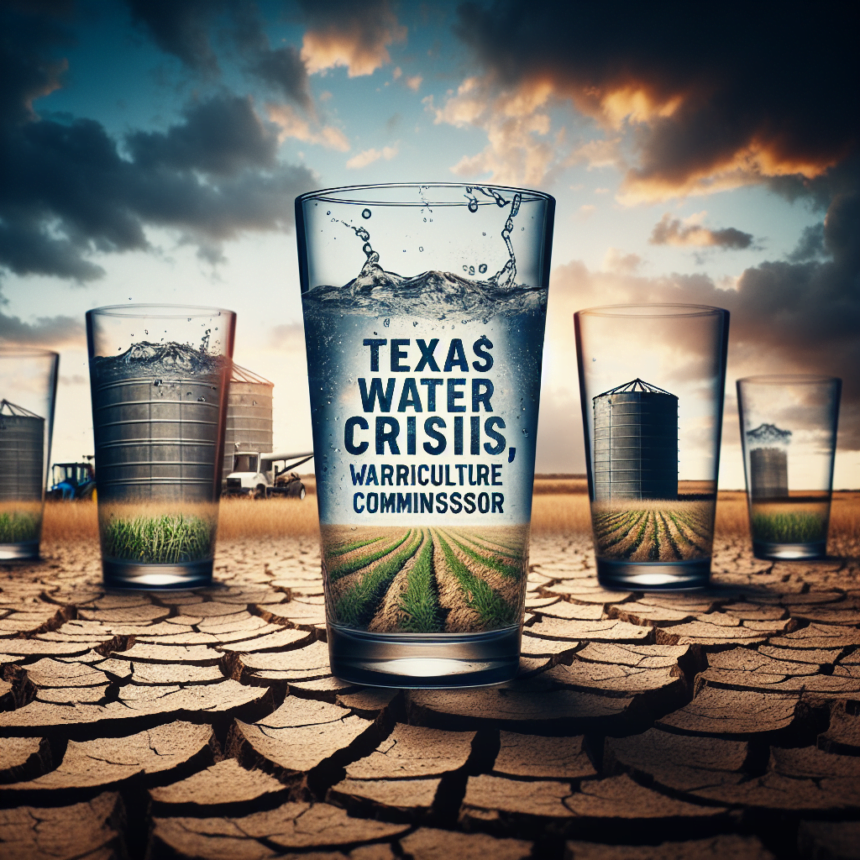Main Points In Hindi (मुख्य बातें – हिंदी में)
-
पानी की कमी की समस्या: टेक्सास के कृषि आयुक्त सिड मिलर ने कहा कि हाल का सूखा, बढ़ती जनसंख्या और पानी की अधिकता राज्य में साफ पानी की उपलब्धता को चुनौती दे रही है।
-
वैकल्पिक जल प्रबंधन उपाय: मिलर ने वर्षा जल संचयन, रिवर्स ऑस्मोसिस और डी-सेलिनेशन जैसे विकल्पों को अपनाने की आवश्यकता पर जोर दिया, ताकि पानी का पुनः उपयोग और साफ पानी की उपलब्धता सुनिश्चित की जा सके।
-
भविष्य की चुनौतियाँ: टेक्सास फार्म ब्यूरो के बिली होवे ने चेतावनी दी कि यदि सेंट्रल टेक्सास में जनसंख्या वृद्धि जारी रही, तो जलाशयों और भूजल कुओं का स्तर पर्याप्त नहीं रहेगा, जिसके लिए नई इंफ्रास्ट्रक्चर की आवश्यकता होगी।
-
सरकारी समर्पण की आवश्यकता: मिलर ने कहा कि सभी सरकारी शाखाओं को इस समस्या को हल करने के लिए सक्रिय रूप से काम करना चाहिए और स्थानीय लोग भी अपने विधायकों से संवाद कर सकते हैं ताकि जल प्रबंधन प्राथमिकता में रहे।
- जल पुन: उपयोग के उपाय: होवे ने सुझाव दिया कि टेक्सास को सैन एंटोनियो जैसे क्षेत्रों की तरह खारे पानी के संसाधनों को अलवणीकृत करने और पुन: उपयोग की प्रणालियों पर ध्यान देना चाहिए, जिससे जल संकट को कम किया जा सके।
Main Points In English(मुख्य बातें – अंग्रेज़ी में)
Here are the main points from the article regarding water conservation concerns in Texas:
-
Water Supply Challenges: Texas Agriculture Commissioner Sid Miller emphasizes the need for alternative water conservation strategies due to increasing struggles of growing cities to meet their water needs, worsened by recent droughts and rising population.
-
Proposed Solutions: Miller suggests employing rainwater harvesting and implementing water treatment methods such as reverse osmosis and desalinization to address the clean water supply issue.
-
Potential Future Shortages: Billy Howe from the Texas Farm Bureau warns that if growth continues in Central Texas without proper management of water resources, existing reservoir systems and groundwater wells may not suffice for future needs.
-
Infrastructure Improvements: Howe advocates for the introduction of new infrastructure in the region to alleviate stress on current systems and explores options such as desalinating brackish groundwater and reusing treated water.
- Call for Government Action: Miller stresses the importance of commitment from all branches of government to find solutions to water scarcity, urging local residents to engage with their lawmakers to prioritize and address the issue effectively.


Complete News In Hindi(पूरी खबर – हिंदी में)
टेक्सास के कृषि आयुक्त सिड मिलर ने हाल ही में राज्य में पानी की स्थिति को लेकर गंभीर चिंता व्यक्त की है। उन्होंने बताया कि बढ़ती जनसंख्या, हाल के सूखे और पानी की अत्यधिक खपत के कारण टेक्सास में साफ पानी की उपलब्धता एक गंभीर समस्या बन रही है। मिलर ने सुझाव दिया कि लोगों को पानी बचाने के वैकल्पिक उपायों पर विचार करने की आवश्यकता है।
उन्होंने वर्षा जल संचयन और इसके उपयोग को लेकर बात की, उल्लेख करते हुए कहा कि यह पानी अलग-अलग उपयोगों, जैसे कि विनिर्माण और सिंचाई के लिए किया जा सकता है। इसके अलावा, उन्होंने रिवर्स ऑस्मोसिस और डी-सेलिनेशन की तकनीकों को अपनाने की आवश्यकता पर जोर दिया, ताकि खारे पानी को साफ किया जा सके और उसे पीने योग्य बनाया जा सके।
मध्य टेक्सास में, टेक्सास फ़ार्म ब्यूरो के अधिकारियों ने हालिया बारिश को एक राहत के रूप में देखा है, जो वर्तमान में जरूरतों को पूरा करने में मदद कर रही है। लेकिन, भविष्य में मौसम के बदलने से यह स्थिति बदल सकती है। बिली होवे, टेक्सास फार्म ब्यूरो के सरकारी मामलों के एसोसिएट निदेशक ने चेतावनी दी कि अगर सेंट्रल टेक्सास की जनसंख्या बढ़ती रही, तो जलाशय प्रणाली और भूजल कुएँ आने वाले समय में शहरों की पानी की आवश्यकताएँ पूरी करने में असमर्थ हो सकते हैं। उन्होंने कहा कि अगर तत्काल कदम नहीं उठाए गए तो आने वाली पीढ़ियों को इस समस्या का सामना करना पड़ेगा।
होवे ने नए बुनियादी ढांचे की आवश्यकता की बात की, ताकि मौजूदा जल प्रणाली पर पड़ने वाले तनाव को कम किया जा सके। उन्होंने सुझाव दिया कि सेंट्रल टेक्सास को उन विकल्पों पर ध्यान केंद्रित करना चाहिए, जो सैन एंटोनियो जैसे क्षेत्रों द्वारा अपनाए जा रहे हैं। इसमें खारे भूजल के अलवणिकरण और पानी के पुन: उपयोग की विधियाँ शामिल हैं।
मिलर ने कहा कि यह सुनिश्चित करने के लिए कि पानी की समस्या और न बढ़े, सभी सरकारी शाखाओं को समाधान खोजने की दिशा में समर्पित रहना चाहिए। उन्होंने स्थानीय लोगों को अपने विधायकों और राज्य प्रतिनिधियों के साथ शामिल होने के लिए प्रेरित किया, ताकि पानी की समस्याओं को प्राथमिकता दी जा सके और इसे प्रभावी ढंग से संबोधित किया जा सके। उन्होंने यह भरोसा दिलाया कि इस समस्या को लेकर वर्तमान में सकारात्मक गति चल रही है।


अंततः, टेक्सास की जल समस्या एक चुनौती है, लेकिन इसके समाधान के लिए ठोस कदम उठाने की आवश्यकता है, जिससे भविष्य की पीढ़ियों के लिए पानी की उपलब्धता सुनिश्चित की जा सके।
Complete News In English(पूरी खबर – अंग्रेज़ी में)
In Waco, Texas, Agriculture Commissioner Sid Miller has emphasized the urgent need for the state to explore alternative water conservation methods. Many rapidly growing cities in Texas are struggling to meet their water demands, exacerbated by recent drought conditions, a rising population, and excessive water usage. Miller advocates for initiatives such as rainwater harvesting for manufacturing and irrigation, and the adoption of technologies like reverse osmosis and desalination to treat saline water for consumption.
The Texas Farm Bureau has noted that recent rainfall has somewhat alleviated water needs in Central Texas, but future weather patterns may not be as favorable. Billy Howe, the Bureau’s Associate Director of Government Affairs, warns that if Central Texas continues to grow at its current pace, existing reservoir systems and groundwater wells will not suffice to support the urban population in the long run. He underscores the necessity of addressing these challenges now to avoid passing on the problem to future generations.
Howe suggests that new infrastructure developments are essential to relieve stress on the current water systems. He highlights that areas like San Antonio are already considering options such as desalinating brackish groundwater and reusing water efficiently. Instead of discharging treated water into the Brazos River, the goal would be to reintegrate it into the water supply system.
To prevent worsening the situation, Commissioner Miller stresses the importance of collaboration across all branches of government to find effective solutions. He encourages community members to engage with their local legislators to ensure that water conservation becomes a top priority and that necessary measures are addressed appropriately. The dialogue among stakeholders is gaining momentum, signaling an increasing awareness of the critical water challenges facing Texas.
In summary, the ongoing dialogue surrounding water conservation in Texas highlights the need for innovative solutions and proactive measures to secure the state’s water future amidst growing demands and environmental challenges.
Source link








